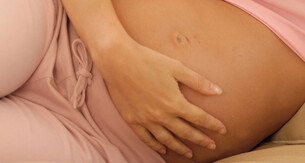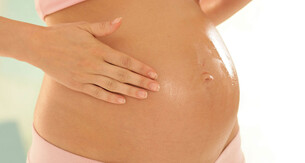Your unborn child is now between 11 and 12 centimetres in size, which is about the size of a pear. They weigh 100 grams, which is about half the weight of an average pear. In week 17, the main developments are your baby’s length, their facial features, and their reflexes and senses. They’ll soon start to put on weight in the form of subcutaneous fat, which will be crucial for surviving outside the womb.
Pregnancy weeks:
Week 17 of pregnancy: Your baby is growing fast

Size of your baby in week 17
Your baby’s development
What it’s like for the mum-to-be in week 17
Top tips
Questions you may want to ask your doctor or midwife
Size of your baby in week 17

Your baby’s development
By week 17, your baby’s face is almost fully formed. Their eyes have moved from the side of their face to the centre, their nose has formed from the initial cartilage, and their unique and unmistakable features are quickly becoming clearer.
Your baby can now smell, hear and taste, and the development of their sensory cells in different parts of their body means they are sensitive all over and are beginning to feel. They may be frightened by loud noises as a result of this increased awareness – if you happen to be having an ultrasound scan at the time, you’ll be able to see how their little body flinches. So it’s probably not a good idea to go to a noisy gig or watch an action film at the cinema.
Something else your baby can perceive in week 17 is brightness and darkness, such as when the sun is shining on your belly. Their attention is caught by the brightness and warmth and they respond to it.
What it’s like for the mum-to-be in week 17
Week 17 is a time of varying feelings for pregnant women, similar to the emotional rollercoaster of puberty. It’s only natural that you’ll be worried about any number of things – this is a brand new challenge for you after all, and you’ll be focusing both on your baby’s health and wellbeing and on how you as a family will cope with everything when they’re born.
Women looking forward to meeting their child and planning their family life will also be experiencing moments of indescribable happiness. Week 17 is also when many mums-to-be notice their “nesting” instinct kicking in: you’ll start working hard to prepare for life as a mum, planning ahead and starting to buy things you need to get your home ready for your new baby.
Midwife’s advice
‘Obviously you’ll want everything to be perfect for your baby, but you don’t have to buy everything at once! At this relatively early stage, you don’t need as much as you think. You’ll have time to buy things once they’re born, when you realise that you really need them.’ Dorothee Kutz, midwife
Your feelings will also affect your dreams, as you process the doubts and fears you experience during the day. They’ll also give you the confidence that you’re strong and that you’ll do everything you can for your child.
Common signs and symptoms
Pregnancy brain
You’re making a cup of tea, and then you’re interrupted by the phone ringing. When you hang up, you’ve forgotten where you left the tea. Does this sound familiar? If so, don’t worry about it: it’s what people call pregnancy brain, the forgetfulness that mums-to-be often experience. It happens because you’re being overworked. In week 17, there are so many new sensations, feelings and information having an effect on you that you can’t easily process it all. There’s no need to be embarrassed about this temporary symptom – you’ll be able to laugh about it later!
Feeling your baby’s movements
If this is your second pregnancy, you’ll just about be able to feel your baby moving as of week 17. If it’s your first child, you’ll have to wait a bit longer. What will it feel like when it actually happens? It’s best described as a kind of tickle or tingle, which gradually gets stronger and stronger. Feeling their baby move is a moment of elation for most pregnant women.
Your womb gets bigger and bigger
As your womb grows, you may well feel the ligaments that support it as they stretch, causing a kind of grinding and pulling sensation. It’s nothing to worry about as long as there aren’t any other symptoms. If you experience rhythmic pains, bleeding or vaginal discharge, however, you should visit your doctor immediately as your child may be in danger.
There are exercises that you can do to lessen the pain caused by your growing uterus, strengthen your pelvic floor and relax those ligaments. Even just getting out and about will do you and your baby the world of good, as it will help you (and them) get more oxygen.
Varicose veins on your legs
At times you may notice small veins on your legs, known either as varicose veins or spider veins. This is completely normal and is no reason to worry: your body has a lot of work to do and is processing a larger amount of blood (another symptom of this is minor nosebleeds). We recommend that you wear compression tights.
Your bump becomes rounder
In week 17, people you meet will be able to tell that you’re expecting a baby. You’ll be on the receiving end of some curious glances, as people figure out that you must be pregnant.
This month, you’ll continue to put on around 250 grams a week. This weight gain is largely due to your womb constantly growing, though the placenta and amniotic fluid also play a part.
The combination of your larger breasts, wider hips and bigger baby bump means that by now you’ll have your pregnancy figure. It’s a reflection of your happiness and will benefit you when your baby is born and you’re breastfeeding them.
Top tips
- Regular pelvic floor training is recommended.
- Getting fresh air is always good.
- Eat light meals made from fresh ingredients.
- Spending time and doing things together with friends is a good way for mums-to-be to relax.
- Start buying your baby’s first clothes.
Questions you may want to ask your doctor or midwife
Targeted exercises for your pelvic floor
Ask your midwife about which exercises you can do to strengthen your pelvic floor. It has a heavy burden to bear for the next few months, and these exercises can help avoid symptoms and side effects.
Have you got varicose veins?
Get the varicose veins on your legs checked by a doctor or midwife, who can tell you if they’re at normal levels for pregnancy or not. They can also give you tips on how to look after your legs to minimise these symptoms.
Effective and healthy nutrition
Ask your midwife for simple recipes, ideally ones for meals full of fibre and nutrients. You can also find more information about nutrition during pregnancy in our online guides.
Information about the author:
Juliane Jacke-Gerlitz is a registered nurse. She has been working in the field of mother and breastfeeding counselling for more than ten years. Currently she is working as a medical writer and psychological consultant. Juliane Jacke-Gerlitz has been married for 22 years, is a mother of eight children and lives with her family in Halle.
Chat with us on Messenger at m.me/hipp.ph




